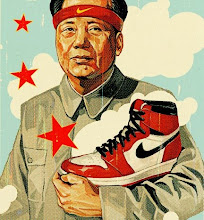It's been a few weeks since the Mattel toy recalls first started. Since then millions of toys have been taken off the shelves all over the world, a Chinese factory owner hung himself and the "Made in China" name is being dragged through the dirt in the US media.
Just about everyone in the US has jumped on the hating. There have been countless examiniations into the saftey of everything China makes and an unseen fervor has developed. Democrats and Republicans alike are attacking China as the now "irresponsible" global production machine.
While I can not make any statements regarding food recalls or underware, as a person who has worked in the toy industry (my job was to liason between the factory and the US design staff), I see this situation really clearly:
It isnt really the Chinese company's fault!
During the design process, there are a lot of considerations for safety. Only certain materials could be used for certain aged kids and the spacing between motorized parts had to be a certain width. Above these basic restraints, all of our toys had to pass a RoHS standard. This applied to the entire packaging, the paint, the materials used, the parts, everything. Before being able to ship any toys, we had to submit them for testing at a hong kong third party. Only with certification from this third party could we ship to Walmart, Target, ect.
In order to pass these tests, we had to control our supply chain. Every shipment of materials were individually checked by our on-site Quality Control team. If anything was wrong with the shipment, the QA team would not accept the entire stock and demand the sourced company to redo it.
In essance, there were atleast 4 different levels of quality assurance: During design, supply chain, manufacturing and third party testing before shipment. Of course not all shipments were perfect and things did slip through the cracks, but no products were recalled when I worked there. None.
So with my own first hand experience, I was terribly shocked when I heard of Mattel's recall. How could the biggest toy company in the US allow so many millions of toys be shipped? What happened to all of the different layers of testing and retesting. Also, why didnt the US media find the real reasons for the problems instead of making China the scapegoat?
Well finally, someone did. Only in
today's NY Times has there been any mention of the innate problems within Mattel's business.
Mattel has been manufacturing in Asia far longer than many companies (the first Barbie was made there in 1959). That led to long-term relationships with certain Chinese contractors, many spanning decades. Paradoxically, that appears to have contributed to Mattel’s problems: the longer it outsourced to a factory supplier with good results, the looser the leash became.
During Mr. Eckert’s tenure, the company has scaled back the number of companies it uses and the fraction of Mattel toys that they make, but it allowed its more reliable suppliers to do their own regular toy testing — with spot tests by Mattel only every three months.
The two contractors that caused this month’s recalls were among the most trusted. Lee Der Industrial, the supplier involved in the first recall, had worked with Mattel for 15 years. The Early Light Industrial Company, the contractor that made the Sarge cars in the second recall, has supplied toys for 20 years.
Mattel became so confident in their China production that it basically gave all control to their subcontractors. Instead of making sure they had final say of what toys were being shipped, the left it up to their Chinese counterparts. What responsible company would decide to do that? No smart company would ever think of giving all control for their products to someone else.
Still Mattel execs want to refocus the blame on the Chinese:
“I think it’s the fault of the vendor who didn’t follow the procedures that we’ve been living with for a long time,” Mr. Debrowski said.
I guess Mr. Debrowski has never worked in a Chinese factory (like I have). Maybe if he worked there for 2 weeks, he would see that Chinese employees need constant attention. Only micromanagers with attention to detail can actually confirm that any processes are used. Without this oversight, any "procedures" are just random words on paper.
All in all, the real issue is money. The real reason why Mattel gave so much autonomy to their contractors was because they wanted higher profits. In order to have their own staff oversee and manager the production, QA and other processes, it would cost Mattel much more money. Instead, they calculate the cost and overhead of the Chinese manufacturer, add 15% for the Chinese company's margin and not worry about anything else. For a toy that costs the Chinese company $1.20, Mattel sell it for $4.50 to Walmart. That's quite a profit.
Whey they're making that much money, who cares about a little lead in the paint?
Ultimately, no one is really blaming Mattel for this. If you read the NY Times article, you can see that the underlying tone of it is pro-Mattel. Even the title,
After Stumbling, Mattel Cracks Down on China, shows the bias.
The US (and world) media will continue to attack China while the real culprits enjoy their high profit margins. I guess it's just another symptom of globalization.








